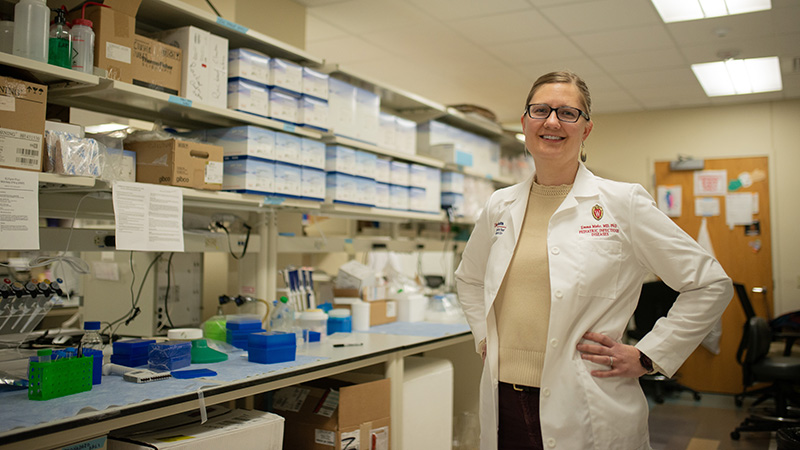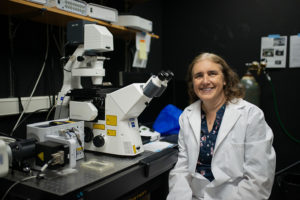
Every year when new students enter the UW School of Medicine and Public Health (SMPH), some combine their medical studies with scientific research, continuing often already extensive undergraduate research experience. Some choose to look for opportunities during the typical course of medical school. Others decide to devote the extra time and work to combining a medical degree and a PhD. Those students can apply to be admitted into the Medical Scientist Training Program (MSTP), which coordinates their medical school and graduate degree requirements, leading to an MD-PhD at graduation. Emma Mohr, MD, PhD, assistant professor in the Division of Infectious Diseases, serves on the admissions committee of the MSTP for UW SMPH.
“There is a link between the Medical Scientist Training Program and residency,” Mohr explained. “When people have completed their MD and PhD training, they go on to residency and find they are sort of thrown into the wild, on their own. They have to figure out how to get the research experience and career development while doing physician training.”
New MDs seeking to continue highly in-depth research in pediatrics now have that option with the UW Department of Pediatrics residency program. Since 2022, Mohr has also been the director of the Physician Scientist Training Pathway within the Department of Pediatrics.
As an MD-PhD, Mohr knew the challenges facing a new resident just emerged from medical and graduate school with a dual degree and an intention to conduct research. She completed her residency at Emory University and the Centers for Disease Control and Prevention in a pediatrics residency with the Integrated Research Pathway — a non-standard pathway recognized and offered by The American Board of Pediatrics.
As all physicians-in-training experience during their residencies, the days and weeks are full. Carving out “extra” or “free time” for anything outside of residency requirements is extremely difficult, if not impossible. Time is a currency that is completely non-fungible: nothing can substitute for it. And research requires time. When Mohr joined this Department of Pediatrics in 2019, she quickly became involved in working toward the department offering the American Board of Pediatrics Integrated Research Pathway. It became available for qualified matched residents entering the department in 2022, under the title “Physician Scientist Training Pathway,” with Mohr serving as its director and promoter.
The Physician Scientist Training Pathway (PSTP) offers participants numerous benefits, including time — extended research time (up to 11 months) out of the regular three-year residency. This and other benefits are particularly developed to accomplish its goal of “training the next generation of pediatric physician-scientists in new approaches to improve child health.”
The PSTP trainees may pursue research in the Department of Pediatrics — and across the entire UW–Madison. The program also engages them in a mentor network, including a special mentoring committee that will help them reach their goals. (“The peer mentor network is really important for people going through this training,” Mohr noted.) Monthly seminars address research and communications skills, such as grant writing, pitches, and abstract preparation. Pediatric residents on this research-intensive pathway are required to complete pediatric subspecialty fellowship training in order to be board-eligible at the end of their training. The Department of Pediatrics has multiple pediatric subspecialty fellowships that these residents can pursue after their residency training. The goal is to provide a continuous clinical and research training environment, from residency through fellowship, to help the trainee develop the research independence needed as a young faculty member. The PSTP webpage includes eligibility and application information.
“When a trainee matches into our program, we apply to the American Board of Pediatrics Integrated Research Pathway for them and support them through this research time,” Mohr explained. “So, we’re not inventing the wheel. We’re providing a pathway that’s supported by our national boards.”
A growing concern in the department has been the decreasing number of medical students who choose pediatrics as their specialty. According to the National Residency Matching Program, in 2014, fewer than a half of one percent of pediatrics residency positions nationwide went unfilled. A decade later, 8% of residency seats nationwide are vacant. Within that decline, fewer future pediatricians are choosing to do research. Making the physician-scientist pathway more visible, more accessible, and seeming far more possible to incipient residents is one way to address that phenomenon. Faculty members who mentor new medical students are encouraged to familiarize themselves with the program and inform their mentees.
“There is opportunity for pediatric trainees to be given research anywhere on this extraordinary campus,” Mohr noted. “We’re an R1 institution that is extremely well funded, and we’re in the top 20 of NIH-funded pediatric departments. We want people to come here for research and help them develop the skills needed to apply for and receive NIH career development awards at the end of fellowship. Our program provides this much-needed training environment here in our wonderful institution.”
The University of Wisconsin Department of Pediatrics Physician Scientist Training Program is the only pediatrics-focused physician-scientist training program in Wisconsin. Mohr emphasized that there are many reasons to live in Madison, and the department wants to ensure that trainees who desire to live in Wisconsin are provided an opportunity for top-notch training.

Anna Huttenlocher, MD, professor in the Division of Allergy, Immunology, and Rheumatology, is a pediatric rheumatologist and physician-scientist. The Huttenlocher Research Group investigates how external cues and cell signaling networks regulate immune cell migration. Huttenlocher is concerned about the declining numbers of pediatric physicians engaging in medical research. She addressed that concern in a small way in the book she wrote about her father, pediatric neurologist and neuroscientist, Peter Huttenlocher, entitled, From Loss to Memory, Behind the Discovery of Synaptic Pruning, released in July 2023. Her father conducted ground-breaking medical research at the University of Chicago throughout his career — as he engaged in a clinical practice for nearly 30 years.
In her book, Huttenlocher promoted the idea that one need not choose to be “only” a clinician. She would like more of her colleagues to consider research as a natural part of their medical path. “By keeping one’s eyes open for the unusual patient,” Huttenlocher said, “possible research questions will naturally arise. Science is a process. We all build on each other.”
The Department of Pediatrics faculty includes many physician-scientists and PhD researchers and their teams. Last year, more than 60 researchers in the department were supported by extramural funding. They served as PI on more than 170 active awards. Many have conducted innovative investigations and made important discoveries, while clinical trials are always in progress. As a whole, the department’s researchers have contributed greatly to the advancement of pediatric health.
Explore the diverse research that some of the department’s early-career faculty members are engaged in:
- Taylor House, MD, assistant professor in the Division of Nephrology, directs the Total Health Research Investigating Values and Empowerment in Kidney Diseases (THRIVE KiDs) Research Group.
- Elizabeth Mann, MD, assistant professor in the Division of Endocrinology and Diabetes, directs the Mann Research Group.
- Claire O’Leary, PhD, assistant professor in the Division of Allergy, Immunology, and Rheumatology, directs the O’Leary Research Group.
- Rebecca (Becky) Richards, MD, PhD, assistant professor in the Division of Hematology, Oncology, and Bone Marrow Transplant, directs the Hematologic Malignancies and Immunotherapy Research Group.
- Ellen Selkie, MD, MPH, assistant professor in the Division of General Pediatrics and Adolescent Medicine and Fellowship Program Director, runs the Learning More from Adolescents Online (LMFAO) Research Group.
Photos by Bob Gordon/Department of Pediatrics